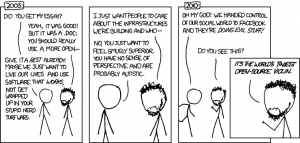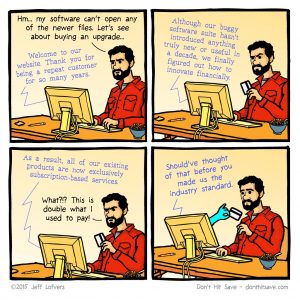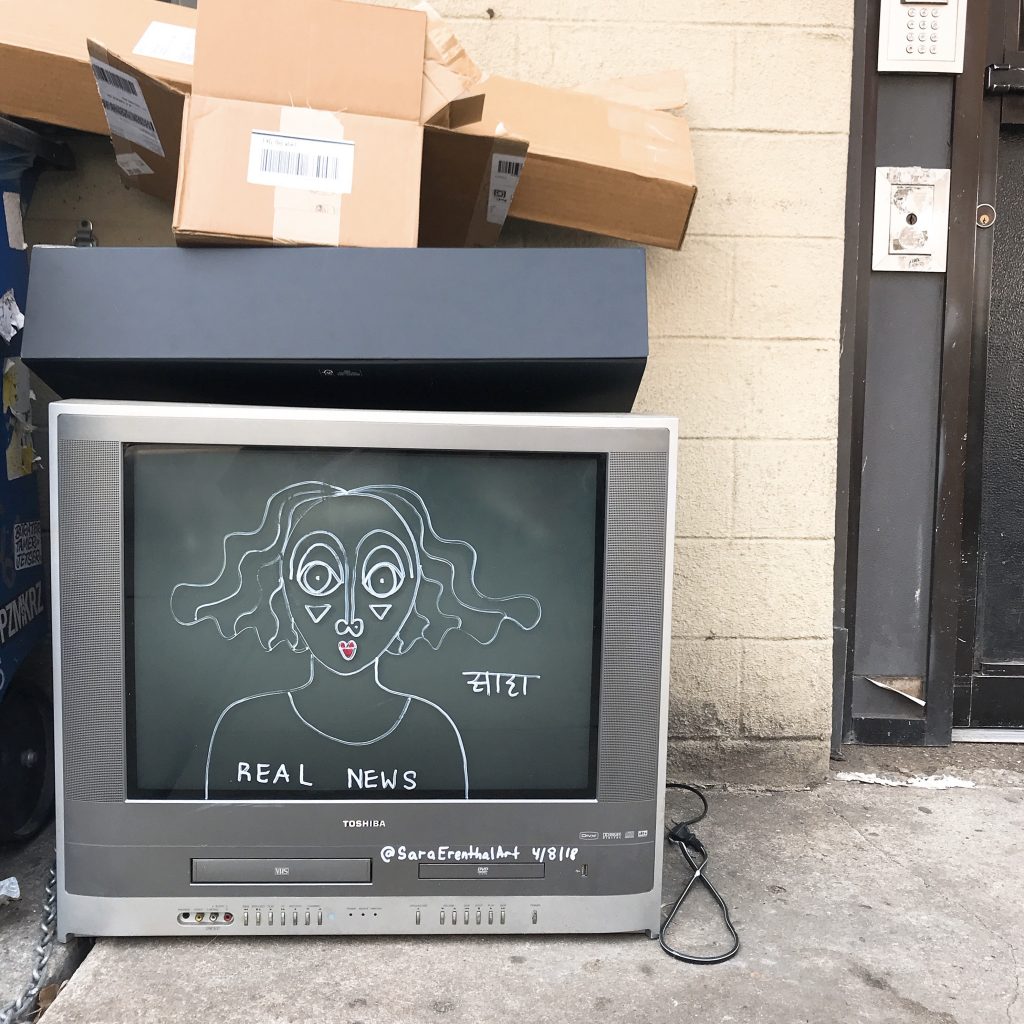Great to see so many of you at Audrey Watters’ terrific talk at the GC last night. She’s posted a transcript of her talk onto her Hack Education website, it’s well worth a read if you weren’t able to make it: http://hackeducation.com/2018/04/26/cuny-gc
Final Project and Presentation
Final Paper Assignment for Core II
Your final work for Core 2 is to produce a project proposal that includes a basic proof of concept. Yes, we will be reading it for a grade, but your true audience for this proposal are the gatekeepers who hold institutional purse strings, allocate resources and space, approve curriculum, or administer technology resources. Your job is to convince this hypothetical reader that your project is intellectually and/or pedagogically vital, builds on but doesn’t duplicate existing work, is done in the most effective and efficient way possible, uses the right tech, and most importantly: that you can pull it off in the time frame that you have available to you: the ITP Independent Study.
Your project proposal should be 12-15 pages in length. You are welcome to follow the guidelines for the NEH Digital Humanities grants, or another discipline specific set of requirements. This proposal will be the basis for your ITP Independent Study proposal. Generally, it needs to include:
- an abstract or summary with a clear problem statement
- a project narrative that gives the practical, historical, theoretical, and technical contexts for the project proposed
- an environmental scan of projects that operate in a similar technical, scholarly, or pedagogical space as yours
- a clear, relevant, and detailed work plan or project timeline
- proof that you have a strategy to complete the project within one semester
Proposals typically include a budget; you may choose to include this, but it is not required. You may find it useful to include your personas and your use case scenarios. Some disciplines may have other, discipline specific requirements; please include those if relevant. We’ll share a grading rubric with you in class on April 30.
The proof that you can complete the project can incorporate your biography, or a description of how the proposed project builds on your previous and related work, but in this instance, you need to complete a proof of concept for the project. This will be different for each of you, but it needs to demonstrate that you have learned enough about the task at hand that you will be able to complete it. Most of this learning is technical, but it might not be exclusively technical.
Some examples of past proofs of concept:
- When proposing a group wiki assignment, one person created a simulation of one assignment at the halfway state, with the text edited in character by the user accounts for each of the 4 personas described.
- When proposing an online resource for images for use in teaching theatre courses, one person created a record for one image in Omeka.
- When proposing a mobile app, one person found an open source quiz app they could build on, changed the text of one of questions, and recompiled the app.
- When proposing a student assignment to create multimedia historical maps of NYC neighborhoods, one student created a sample map with the Google Maps API that contained a map point for each type of media expected to be used (video, audio, photograph, text).
- When proposing a game, a student might present a draft of the game’s narrative, or present one element of its gameplay.
You will be turning in a text, and giving a presentation. The presentation will take place on one of the last two weeks of class, May 14 or 21. These will be 10 minute presentations, with 10 minutes for discussion/feedback. We will invite all ITP faculty to join us, though we don’t expect all will be able to make it for both of the days.
Here is the grading rubric.
The text will be due May 24th. Please upload it as a Word or PDF (or other text) file to the Files area of our course group. We will not give extensions.
Ethical Pedagogy within Unethical Networks
When was the last time you used a landline?
We’ve moved gradually to cellphone and non-phone communication networks over the past few decades. Our old copper-line infrastructure sits largely unused, and now companies like Verizon are moving to scoop up this valuable and unused copper while forcing users onto a fiber network. My parents upstate finally made the switch a few years ago, as their old landline (one of few numbers I remember) only received calls from telemarketers. Since then, however there have been several storms which wipe out their power. After such a storm, their phone’s charge percentage serve as a countdown to total isolation.
It’s not just that “new isn’t always better”, but that the new can make the old worse. The Network Effect is a catch-22 which makes a service valuable only once a significant number of people use it. The inverse, the “No Network Effect” means that even if you don’t like cell phones or emails or whatnot, you WILL upgrade or be removed from society.

xkcd 743 from 2010(!)
This concept is an important addition to the readings, particularly when we think of questions of consent. We may know about algorithm bias, digital redlining, and disparities in how infrastructure services the privileged v the vulnerable. The current platforms are unethical, but what good does knowing do us as individuals? Even if we don’t wish to consent to the current network, it is arranged so that the alternative is being rejected by society.
The questions I tend to focus on in terms of digital pedagogy are (1) how do we build/adopt inherently ethical networks (e.g. FLOSS)? And (2) how do we divest from or break unethical networks? Any educator plays an important role tools and platforms for their students, and these choices are inherently political. Teaching photoshop over GIMP; using SPSS over R; or accepting ‘.docx’ over ‘.odt’, are all choices which reduce or promote our students digital rights. How do we also balance this influence with what the Network Effects of industry standards?

A new question that came up for me this week was, to what extent are we also responsible to address these issues as they pertain to our students out-of-class lives? It’s one thing to not use facebook for class discussions, but our students are still on the platforms which don’t respect consent. (Platforms such as facebook go through great lengths just to avoid basic protections)
While this discussion is not at all relevant to most of our fields, should we dedicate some class time to it regardless? Similar to questions of litteracy, the curriculum fails to address these concerns anywhere along k-PhD.
I suspect I will in the future, if for no other reason than to justify why I am asking for “.odt” files. I’m interested in your feedback on what feels useful and what you imagine students would stick to, so I’ve prepared an example of a mini-cryptoparty-worksheet I might present to future students (in addition to discussing the issues above).
Have fun 🙂
Cryptoparty Worksheet
Even if you don’t care about your data, you should care about your shadow! Watch:
Data detox basics:
- Go through settings! The defaults are always worse than they need to be.
- Install these browser extensions: HTTPS everywhere, Privacy Badger, Terms of Service; Didn’t read, and uBlock Origin (Firefox/Chrome)[not the other adblockers out there!]
- Avoid using your phone! Computers give you much more control.
- Keep detoxing here: https://datadetox.myshadow.org/detox
Before using any tool or service, ask yourself:
- Is it free and open source, or is it proprietary?
- What do you know about the company which owns the service?
- What are the terms of service?
“Lost in the small print” Helps make things more readable- Has the tool been security audited?
- Who carried out the security audit?
- Don’t like the answers? Find alternatives!
https://prism-break.org/en/
https://alternativeto.net/
Additional readings of relevance
Hi everyone, I wanted to post a link to the Association of College & Research Libraries’ Framework for Information Literacy in Higher Education, which Lauren mentioned in class earlier this week, which should help contextualize recent work by academic librarians on information literacy.
I also wanted to share some additional, optional reading for our 4/23 class on Digital Ethics next week: This recent article in the Chronicle of Higher Ed by Chris Gilliard “How Ed Tech is Exploiting Students” (paywalled, though if you’re on campus you should be able to read it via the link, and I’ve uploaded a PDF into the course group as well).
Provocation: Wikipedians
I did not know that 90% of Wikipedians were male. And this is not just in the U.S. but internationally, according to Ayush Khanna’s report: Nine out of ten Wikipedians continue to be men: Editor Survey. (2012)
On Saturday, I will be part of a group of writers joining in The Asian American Writers’ Workshop for a Wikipedia Edit-a-Thon for Asian American Literature. In this, we won’t separate Asian American women writers from male authors. But after reading the New York Times article by Amanda Fillipachi on wikipedia gender segregating American novelists, I wonder if we should also invade the American novelists Wikipedia page and add Asian American authors like Ed Lin, Carlos Bulosan and etc.
How have these statistics changed in the past six years?
I see that Wikimedia has become more active in bridging these gaps in gender and race (the Asian American Literature edit-a-thon is co-sponsored by Wikimedia). Is there more attention paid to recruiting grassroots community organizations built around identity to contribute?
In Feminist WikiStorming The best lesson a professor can teach seems to be one in which the student is given the tools to become a producer. And by structuring assignments that encourage students to edit and create Wikipedia pages for artists overlooked by the typical editors, then it becomes one way to break these hegemonic narratives.
What topic-specific kinds of wiki-storming would you participate in or initiate with students?
I’m definitely enthusiastic about having students edit and create Wikipedia pages!
Digital Ethics Pre-Provocation: Data Selfie
Hey everyone, I will be writing a provacation on digital ethics later this week. I’m planning to make it very interactive, however one activity I’d like people to try does require a few days notice.
For folks who use Facebook on Firefox/Chrome, there is an open source extension I encourage you to install this week called DataSelfie.it. This extension collects the same sort of data Facebook does, but stores information on your computer (not online) for your own analysis. The results give you a pretty good sense of what Facebook thinks of you, and what Cambridge-Analytica was actually up to with your data.
Here is a video to explain:
Wish everyone the best in today’s storm ~
Provocation – “Digital Literacy”

As I walked past my apartment’s trash bins on my way to a cafe to write this post, I came across Sara Erenthal’s street art that turned an abandoned television into an artwork. The word, “Real News,” framed in a television-trash (in a literal sense), immediately captured my attention. When did we start to put “real” in front of the word “news” or “fact” (with or without irony)? Do the words such as “real” or “news” (or fact, truth, etc.) still have as much credibility in the age of the Internet and social media as they used to have (mostly in the age of more traditional forms of journalism)? What constitutes real, fact, news and who approves the validity? Although the contents and the specific contexts of this week’s readings are in a wide-range, I think these are some of the basic and recurring questions. I spent more time than I expected to in doing both close and “lateral reading” (Sam Wineburg) of this week’s articles (i.e. following the hyperlinked texts, Googling some names or websites as suggested, skimming through the Wikipedia talk pages, etc.) and I needed to stop reading at a certain point, because otherwise I wouldn’t be able to write a post. I think this discursive journey reflects the process of reading and writing from/on the digital platforms, as the sources on the Internet are abundant (with or without multiple hyperlinks or further-related readings). Compared to my previous provocation for the ITP Core 1 class, which was a close reading of the chapters 3 and 4 of Paulo Freire’s Pedagogy of the Oppressed, the experience of reading and writing about “digital literacy” already embodies the different nature of knowledge/information production and circulation system. This is more personal remark based on my experience of writing, so if it doesn’t make any sense here I hope I can articulate it more in class. But the reason why I brought up the experiential layer is to emphasize the that digital literacy is a different mode of literacy, thus should be taught differently. The question is, HOW?
Sam Wineburg, Barbara Fister, Alex Juhasz all share similar anxieties over the culture built on the Internet–the circulation of misinformation/disinformation. I think all of them are good at identifying the problems and arguing for the changes, but I think the solutions they are providing should be more concrete and specific.
Sam Wineburg mentions four steps to “combat” fake news very briefly and generally. His article ends with saying “Schools must prepare kids for the real world instead of shielding them from it,” and I agree with his general idea, but I was not sure if he is proposing an individual teacher’s role and/or more organizational-educational reform. He emphasizes the teacher’s role and suggests, “Make sure teachers are trained on the matter.” However, I think the part of anxiety or struggle over this issue is that “adults” (as opposed to the digital natives) are not sure where we are heading towards, and there’s not always clear consensus on this issue. Barbara Fister’s article is also good at identifying the problems that Twitter, Facebook, Google produce, but again her article ends with “I don’t even know where to start”—which was a bit disappointing to read at this moment.
How can we move one step further to think about what we can teach more concretely–starting from where the authors left off? In the context of Facebook data breach and Mark Zuckerberg’s Facebook hearing, how can the educators take advantage of it as a teaching moment? How can we concretize individual educator’s role but not lose sight of the institutional and societal aspects?
One of the hyperlinked articles from one of the readings this week—“Media literacy in 2016: Strategies to decipher what is real and what is fake news on your newsfeed”— includes some key questions we should be asking about our media consumption (not only limited to digital media):
Who is the sender of the message?
What is their motive or intent?
Who benefits from the message?
What tips and tricks do they use to get their message across?
Who is their intended audience?
What are they leaving out?
How could others interpret the message differently than you?
Do you think we need to add more questions specifically relating to digital media consumption? What are some questions that you can think about to add-on in general or more specifically relate to your field of study? How can we think about digital literacy and digital platforms beyond moralizing ground (meaning beyond just blaming the individuals or organizations spreading propaganda-fake-misleading information)? Do you think “reading laterally” is a good way of critically consuming information? I had an impression (and correct me if I am wrong) that much discussions around digital literacy are still focusing more on words and not much on the visual side of it. What was your impression?
Links from 3/26 class
Hi everyone, just wanted to share some of the sites we discussed in class this past Monday:
– The Student as Producer project at the University of Lincoln, run by Joss Winn and Mike Neary: http://studentasproducer.lincoln.ac.uk/
– Jim Groom began the Domain of One’s Own project at the University of Mary Washington: http://bavatuesdays.com/domain-of-ones-own-a-technical-overview/
– And for use in our own research/publishing, Think, Check, Submit is a terrific resource: https://thinkchecksubmit.org/
Have a great break!

